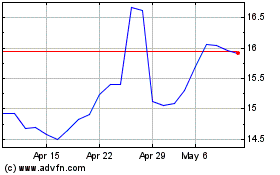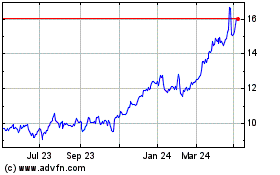Deutsche Bank Approved Property Sale to Russian Businessman Despite Internal Objections -- Update
October 31 2019 - 12:44PM
Dow Jones News
By Jenny Strasburg
Deutsche Bank AG officials approved the sale of a chunk of
Silicon Valley real estate to a Russian businessman despite
objections from its U.S. reputational risk committee, according to
documents and people familiar with the matter.
The lender's Germany-based global reputational risk committee
approved the $72 million deal in May 2018, overruling concerns
raised by executives including the one responsible for Deutsche
Bank's U.S. anti-money-laundering controls, the people said. He has
since left the bank.
The transaction, which was championed by its real-estate team,
occurred at a time when Deutsche was under scrutiny by members of
Congress over its Russian business relationships.
Deutsche Bank continues to hand over documents to Congress in a
probe of money-laundering controls and longtime links with Russian
companies and oligarchs. A U.S. Justice Department investigation
into aspects of those Russia relationships and the bank's handling
of internal red flags is ongoing, according to people close to the
bank and its interactions with investigators.
Spokesmen for Deutsche Bank and its asset-management arm, DWS,
said the business was acting as a fiduciary for fund investors.
They said the deal went through the bank's processes to prevent
money laundering and other financial crimes by clients. The deal
didn't involve financing from Deutsche Bank, they said.
"Consistent with our policies and procedures extensive due
diligence was conducted on this transaction and involved, among
others, the [anti-financial crime] unit of Deutsche Bank.
Additionally, the transaction was made subject to the reputational
risk assessment procedures in place at that time," a spokesman for
DWS said.
The bank identified no evidence the deal "would violate money
laundering or sanctions laws. As a result, the discussion of
whether to move forward with the transaction was focused on
reputational considerations, " a spokesman for Deutsche Bank
said.
"There are processes in place that govern reputational risk
considerations, and regional and global judgments about these
considerations can differ, as occurred in this instance," the
Deutsche Bank spokesman said.
Deutsche Bank is one of Wall Street's most troubled operators,
hamstrung by a legacy of aggressive lending practices and
regulatory lapses. The bank has paid large fines for failures to
police money coursing through its network, including transactions
that moved billions of dollars out of Russia. The bank is currently
going through a painful downsizing.
Deutsche Bank's asset management arm bought into the property on
behalf of clients in 2016. A private Bay Area firm called
Embarcadero Capital Partners also held a joint stake, according to
the companies.
The 6.6-acre property is located at 80 Willow Road in Menlo
Park, Calif., featuring a single-story office complex with
Spanish-colonial adobe and midcentury modernist design and
expansive gardens. It was built in the early 1950s as the
headquarters of Time Inc.'s Sunset Magazine, and used by the
publisher for offices, photography shoots and public tours for
decades.
The buyer was Vitaly Yusufov, Russian financier and son of
former energy minister Igor Yusufov, according to documents and
people familiar with the matter. He purchased the property through
a Delaware registered company, according to internal bank documents
and people involved in the sale. Neither Vitaly Yusufov nor his
father responded to repeated requests for comment.
Write to Jenny Strasburg at jenny.strasburg@wsj.com
(END) Dow Jones Newswires
October 31, 2019 12:29 ET (16:29 GMT)
Copyright (c) 2019 Dow Jones & Company, Inc.
Deutsche Bank (TG:DBK)
Historical Stock Chart
From Mar 2024 to Apr 2024

Deutsche Bank (TG:DBK)
Historical Stock Chart
From Apr 2023 to Apr 2024
